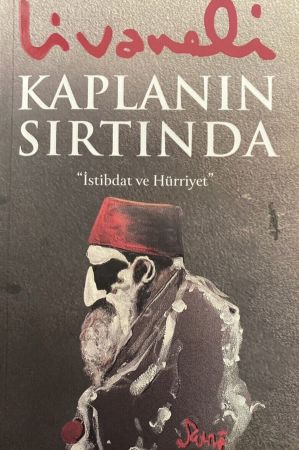A painful look into the dark past - Zülfü Livaneli
- Written by Portal Editor
The Turkish Nobel Prize winner Orhan Pamuk is known to many people in Germany who are interested in literature. No question.
His compatriot Zülfü Livaneli is far less well known in this country. Far wrong, especially as the Nobel Prize winner himself states: "Livaneli is an indispensable authority on the cultural and political scene in Turkey." This positive assessment can also be expressed in other ways: Livaneli is a dazzling figure in the Turkish cultural landscape! The emphasis is on "culture" because Livaneli, born in 1946, is versatile.
Member of the traditional "Republican People's Party"
 As a composer and singer-songwriter, he has gained international renown and awards with his albums and film scores. As a director, he was celebrated with his films at various film festivals. With the joint music projects and concerts with the Greek stars Maria Farantouri and Mikis Theodorakis, he gave important impetus for improving Greek-Turkish relations. His books regularly conquer the bestseller lists in his home country. He has been a UNESCO ambassador since 1995 and until 2007 he was a member of the traditional "Republican People's Party" in the Turkish parliament.
As a composer and singer-songwriter, he has gained international renown and awards with his albums and film scores. As a director, he was celebrated with his films at various film festivals. With the joint music projects and concerts with the Greek stars Maria Farantouri and Mikis Theodorakis, he gave important impetus for improving Greek-Turkish relations. His books regularly conquer the bestseller lists in his home country. He has been a UNESCO ambassador since 1995 and until 2007 he was a member of the traditional "Republican People's Party" in the Turkish parliament.
So today Livaneli enjoys a high reputation in Turkey across the board. But that was not always so. Livaneli has also seen other times. Times when his music was banned. Times when he could only compose film music under a pseudonym. Times when he could no longer be sure of his life and had to go into exile in Sweden for a few years. Many of his nationalist-minded compatriots would gladly exile him even today! Because Livaneli has - once again - not cared about social taboos and chose a topic for his new novel that causes a sensation. A tragedy from Turkey's recent past, in which Germany, England and Russia were also involved. Livaneli sets the story in the present and repeatedly dives into the unresolved past.
In the present, two characters are the focus of the novel: On the one hand, the young Maya, single mother of a 14-year-old son and, as an employee of the University of Istanbul, responsible for looking after foreign guests. On the other hand, Professor Maximilian Wagner, who has travelled from the USA to give a lecture, is in the care of Maya. Maya quickly realizes that the 87-year-old man with German roots is overcome by a deep sadness when she takes him to certain places in Istanbul. It turns out that both the Turkish and the Russian secret service are following the two at every turn. The elderly professor is keeping a secret that he tells the young woman one long night.
Refuge from Hitler's henchmen on the Bosphorus
 Wagner came to Turkey as a political refugee, seeking refuge from Hitler's henchmen on the Bosporus, like many other Germans. But his wife Nadja did not manage to escape together. With the help of dedicated compatriots, Wagner found an expensive way to have them follow: on board the old ship "Struma". With 761 other Jewish refugees, Nadja boarded the ship in Constanta, Romania, bound for Palestine. But things turned out differently. The decrepit ship had an engine failure and was anchored on the Bosporus. A further journey was out of the question. The British refused entry into Palestine and forced the Turks to forbid shore leave. The people on the completely overloaded ship endured the cold Istanbul winter for two agonizing months. Finally, later, on February 24, 1942, the "Struma" sank at the mouth of the Bosporus and was demonstrably torpedoed by a Russian submarine. Only one person survived. And all the time Wagner was near the ship, could even see his beloved Nadja, but could not get to her.
Wagner came to Turkey as a political refugee, seeking refuge from Hitler's henchmen on the Bosporus, like many other Germans. But his wife Nadja did not manage to escape together. With the help of dedicated compatriots, Wagner found an expensive way to have them follow: on board the old ship "Struma". With 761 other Jewish refugees, Nadja boarded the ship in Constanta, Romania, bound for Palestine. But things turned out differently. The decrepit ship had an engine failure and was anchored on the Bosporus. A further journey was out of the question. The British refused entry into Palestine and forced the Turks to forbid shore leave. The people on the completely overloaded ship endured the cold Istanbul winter for two agonizing months. Finally, later, on February 24, 1942, the "Struma" sank at the mouth of the Bosporus and was demonstrably torpedoed by a Russian submarine. Only one person survived. And all the time Wagner was near the ship, could even see his beloved Nadja, but could not get to her.
Livaneli did a lot of research for his story. It is his merit that, in addition to the goiter tragedy, he also gives an insight into the world of German-Jewish emigrants, the many professors, politicians and artists who lived in safe Turkish exile until the end of National Socialism. Among them were the later Governing Mayor of Berlin, Ernst Reuter, the lawyer Ernst Hirsch and the sculptor Rudolf Belling.
"Serenade for Nadja" is a very successful, an important book
 At the same time, Livaneli shows his readers that many of his compatriots also have flight and uprooting in their family history. An example of this is Maya, whose Armenian grandmother had to deny her origins after the genocide and whose second grandmother, a Crimean Tatar, was the only one of the family to survive persecution and death.
At the same time, Livaneli shows his readers that many of his compatriots also have flight and uprooting in their family history. An example of this is Maya, whose Armenian grandmother had to deny her origins after the genocide and whose second grandmother, a Crimean Tatar, was the only one of the family to survive persecution and death.
"Serenade for Nadja" is a very successful, an important book. Only with a small flaw that is probably due to Livaneli's overzealousness: He packs a lot of thematic content into the story and occasionally has an extremely enlightening gesture, as if he didn't trust his characters enough. But he is happy to forgive this small weakness, because after all he has given us a moving piece of literature that is exciting for a long time and shed light on a dark episode of Turkey's past that has so far been hushed up.
Nevfel Cumart
Zülfü Livaneli: Serenade for Nadja. Novel. Klett-Cotta Verlag; Stuttgart. 336 pages, 21.95 euros.
Please read as well:
